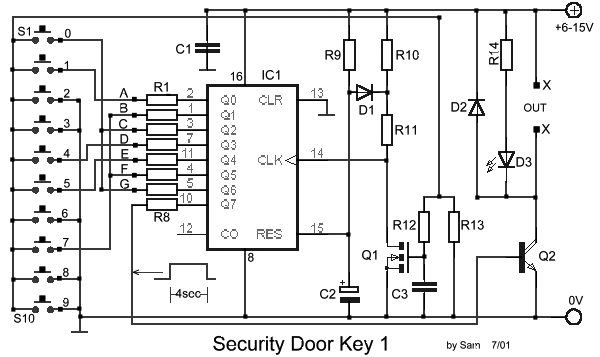
| Statistics |
Total online: 1 Guests: 1 Users: 0 |
|
 | |  |
| | Home » Alarm » Electronically Controlled Security Door Keyboard
13:38 Electronically Controlled Security Door Keyboard |
The circuit was constructed to provide a simple electronic lock system based on a single integrated circuit and will require a code of seven digits. 
- 4022 – a 4-stage CMOS counter with 8 decoded outputs used for binary counter/decoder, divide-by-N counting, frequency division, decade counter/decimal decode display, and counter control/timers due to its features such as standardized symmetrical output characteristics, medium speed operation, parametric ratings (5V, 10V, 15V), 100% tested for quiescent current at 20V, and fully static operation
- BS170 – an N-channel enhancement mode field effect transistor designed to minimize on-state resistance while providing reliable, rugged, and fast switching performance and particularly suited for low voltage, low current application such as power MOSFET gate drivers and small servo motor control due to its features of high saturation current capability, voltage controlled small signal switch, and high density cell design
- BD679 – a monolithic NPN Silicon epibase power Darlington transistor with resistors and diode in a TO 126 plastic package and is typically used for AF applications due to its high current gain
The construction of the circuit is relatively simple since it utilizes a very few components. One important thing to be considered in doing this circuit is the time it will take, after the push button switches are pressed, for the code to reach the main IC. There will be a delay unless all the keys were entered. When the right sequence of code was entered correctly, the output of Q7 will be activated for approximately 4 seconds. This will drive the transistor Q2 which in turn would drive one relay that will open the door or any other circuit attached. The use of red LED D3 provides a visual indication of the activation of Q2. The code that has been set for the circuit is 1704570, as seen in the diagram. This was made possible by the arrangement of the resistors with their corresponding connections to the switches. The resistors are arranged from points A to G order while the switches are connected to the corresponding resistors in random order. The security code can be changed by altering the connections between the switches and the outputs of the IC1. R1-7=4.7Kohm
R8=15Kohm
R9=1Mohm
R10-13=10Kohm
R11=100ohm
| R12=220Kohm
R14=1.2Kohm
C1-3=100nF 100V
C2=4.7uF 25V
D1-2=1N4148
| D3=RED LED 3mm
IC1=4022
Q1=BS170
Q2=BD679
S1-10=Push button or keyboard
|
In most secured places with the capability of the company to purchase high end equipments, an electronic key operated door is usually installed. This will prohibit the entry of unauthorized persons or verify the entrance of a person by supplying the correct key code. This electronic security door key may also be found on vehicle doors for locking and unlocking purposes. Other establishments that utilize this are jewelry shops, banks, apartments, factories, hotels, prisons, apartments, and homes. They are very reliable since they are convenient to use and can be integrated easily with other circuitries. |
|
Category: Alarm |
Views: 2481 |
|
| |
 | |  |
|
|
| |





